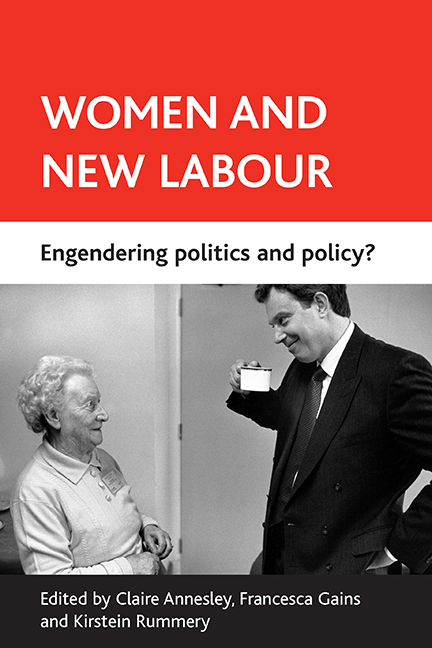two - Theoretical underpinnings: women, gender, feminising and politics
Published online by Cambridge University Press: 15 September 2022
Summary
Introduction
This volume is primarily concerned with the assessment of New Labour as it purposefully sought to promote the interests of women and reduce inequalities between the sexes. In Parts Two and Three each author teases out the implications of the politics and policies underpinning New Labour's celebrated attraction to, and for, ‘women’ and ‘women's issues’. Along their journey in interpreting ‘the needs of women’, authors traverse a conceptual terrain which, while crucial to reaching their final destination, might take more time to detail sufficiently than possible within the confines of one chapter. Moreover, given that most of the authors share a general perspective on this conceptual terrain it seems suitable that one chapter could offer a brief picture of the theoretical underpinning through an examination of key concepts found in the political and policy discourse in relation to gender specificity. Such is the task of this chapter.
To begin, it is worth articulating the boundaries of this chapter as it is an overview of a few fundamental concepts employed within this text and conceptually motivated readers may wish to consult references for further elaboration. Moreover, any ‘bird's eye view’ necessarily involves the eye of a particular ‘bird’, or author. My own account of the terrain shares in a set of values which I believe informs this collection. Undoubtedly, each individual author may find their particular understanding more informative to their own analytical journey and we have worked together to avoid overlap while encouraging lively conversation of ideas and perspectives. Nevertheless, the articulated aims of ‘reducing inequalities’ and ‘promoting the interests of women’ rests upon familiar, but contested, ground within feminist discourse. For example, ‘the interests of women’ reflects the desire to articulate a common experience of patriarchy that permeates much of secondwave feminism. Even a call to ‘reduce inequalities between the sexes’ raises questions about the kinds of (in)equality between the sexes; the desirability to reduce ‘inequalities’; and the binary distinction between male/female and how this may map on to gender construction.
Potential perils of essentialism, assumptions of ‘feminism’, and agendas of liberalism can be traced through key ‘policy and politics’ textbooks. Social policy literature over the last 50 years has employed a similar ‘women and x’ formula for policy analysis.
- Type
- Chapter
- Information
- Women and New LabourEngendering Politics and Policy?, pp. 27 - 42Publisher: Bristol University PressPrint publication year: 2007



